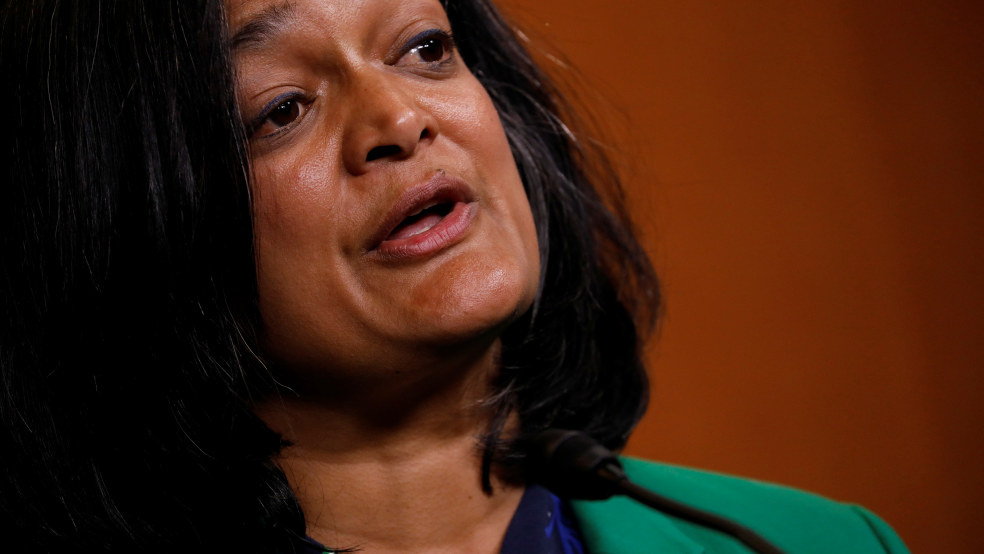Biden and congressional Democrats are inching closer to agreement on how much to scale back their $3.5 trillion package to expand the social safety net and combat climate change, though they still face major disagreements on the details of the legislation.
Biden pitches his plans: Biden on Tuesday traveled to Howell, Michigan — located in a key election swing district — to sell his economic agenda beyond the D.C. Beltway. “Biden’s travel strategy is guided in part by a desire to show his plans are popular even in areas represented by at-risk Democrats,” The Washington Post reported, citing a White House official.
In a speech at the International Union of Operating Engineers Local 324 training facility, Biden said that the nation is at an inflection point that requires large-scale investment and argued that the two major pieces of legislation lawmakers are now debating, the safety net package and a $1 trillion infrastructure bill, would “breathe new life” into the U.S. economy and maintain its competitiveness with China.
“We risk losing our edge as a nation. Our infrastructure used to be the best in the world, literally not figuratively," Biden said. "Today, according to the world economic forum, we rank 13th.” He added that it isn’t enough to just invest in physical infrastructure — the country must invest in education and other aspects of what his administration has termed “human infrastructure.” And he emphasized his plans to pay for his agenda by taxing the rich and corporations.
Democrats narrow the gap on costs: Yet even as Biden was again laying out a broad vision for remaking the economy for the rest of the 21st century, the president and congressional Democrats have been discussing how to pare back the size of their sweeping $3.5 trillion Build Back Better package.
Biden held a virtual meeting Monday with a dozen progressives and reportedly repeated a new lower target range for the bill of $1.9 trillion to $2.2 trillion. Rep. Pramila Jayapal (D-WA), chair of the Congressional Progressive Caucus, reportedly countered with a range of $2.5 trillion to $2.9 trillion. And Sen. Joe Manchin (D-WV), the centrist who last week indicated his limit would be $1.5 trillion, signaled Tuesday that he’d be open to something in the range of $1.9 trillion to $2.2 trillion.
“I’m not ruling anything out,” Manchin told reporters, “but the bottom line is I want to make sure that we’re strategic and we do the right job and we don’t basically add more to the concerns we have right now.”
While some lawmakers are still pressing for a larger package, the numbers being discussed suggest that Democrats have managed to quickly narrow what last week appeared to be a roughly $2 trillion gap.
Still, there are plenty of disagreements on the substance of the legislation that still need to be worked out. Those reportedly include Manchin’s demands that the bill include the Hyde Amendment restricting the use of federal funds for abortions and that natural gas be eligible for a clean energy grant program.
Tough choices on cuts: Democrats will also have to decide whether to jettison some portions of their plan to focus on top priorities or keep as many pieces as possible while cutting their duration or the number of people who will benefit from them. “The theme among members is to do fewer things better,” House Speaker Nancy Pelosi reportedly said on a call with top Democratic lawmakers. Biden, meanwhile, reportedly told progressives Monday that he is open to means-testing some programs, a cost-cutting measure that Manchin has advocated.
Progressives, though, have suggested using some shorter timeframes to reduce costs, on paper at least. “Some Democrats are betting that if popular programs like free community college or universal prekindergarten care are passed and then expire, it will be relatively easy to extend them, since any effort to take away such everyday benefits would be unpopular,” the Post reported.
Some centrists object to that approach. “The idea that we would enact a whole bunch of programs and sunset them after two years, three years, four years, to me that’s just budget gimmickry,” Rep. Ed Case (D-HI) told The Hill on Monday.
A silver lining for Democrats? While they debate just how to scale back their plans, a smaller package may reduce some friction once Democrats turn to the revenue side of the ledger — or at least that’s what Biden officials hope. “Administration officials also say the reduced cost of spending and tax cuts in the bill means Democrats will have an easier time settling on the revenue increases — including tax hikes on high earners and corporations — to cover the price tag,” The New York Times said.
Budget
Dems Inch Toward Compromise on Biden Agenda





